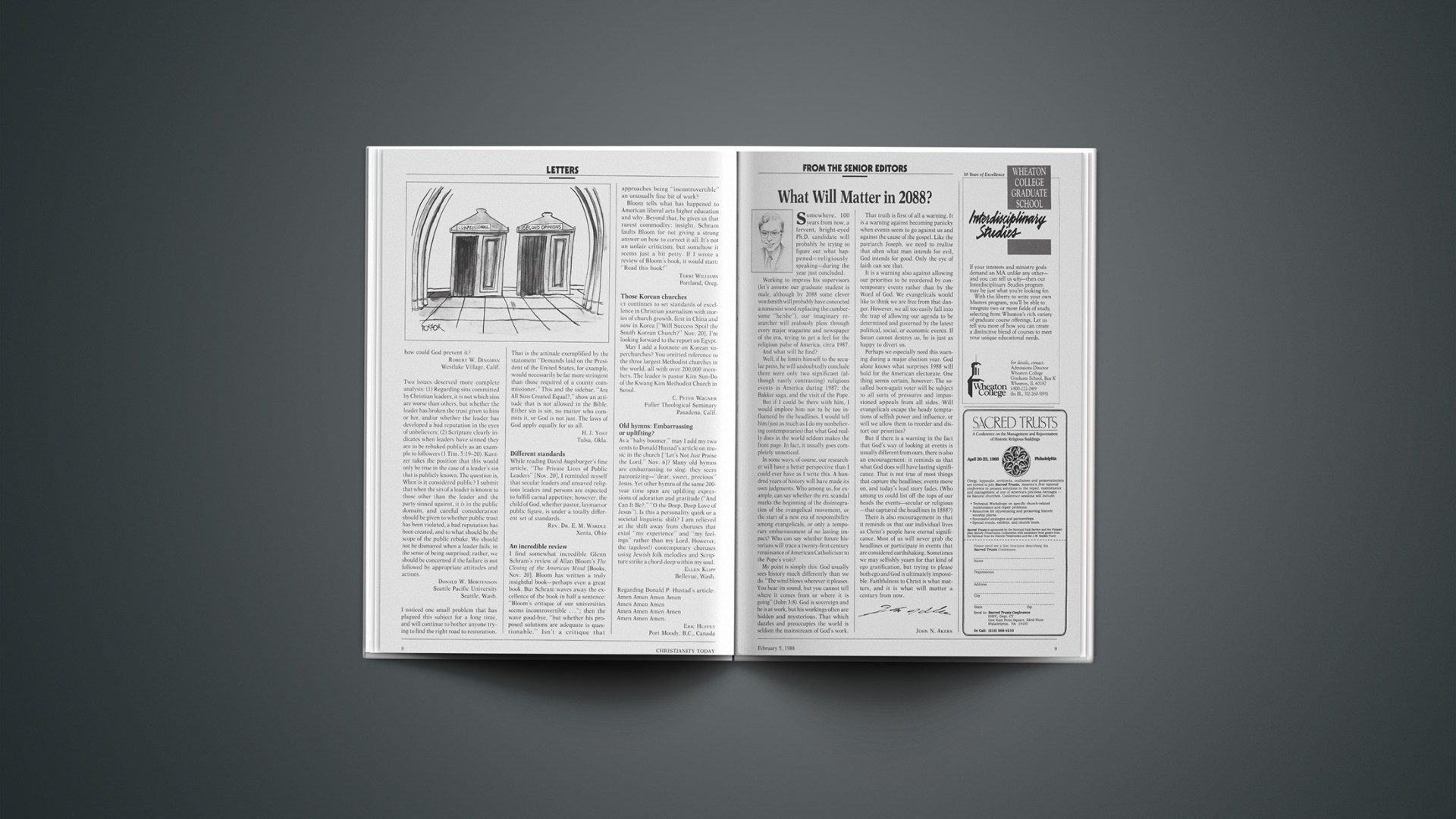Somewhere, 100 years from now, a fervent, bright-eyed Ph.D. candidate will probably be trying to figure out what happened—religiously speaking—during the year just concluded.
Working to impress his supervisors (let’s assume our graduate student is male, although by 2088 some clever wordsmith will probably have concocted a nonsexist word replacing the cumbersome “he/she”), our imaginary researcher will zealously plow through every major magazine and newspaper of the era, trying to get a feel for the religious pulse of America, circa 1987.
And what will he find?
Well, if he limits himself to the secular press, he will undoubtedly conclude there were only two significant (although vastly contrasting) religious events in America during 1987: the Bakker saga, and the visit of the Pope.
But if I could be there with him, I would implore him not to be too influenced by the headlines. I would tell him (just as much as I do my nonbelieving contemporaries) that what God really does in the world seldom makes the front page. In fact, it usually goes completely unnoticed.
In some ways, of course, our researcher will have a better perspective than I could ever have as I write this. A hundred years of history will have made its own judgments. Who among us, for example, can say whether the PTL scandal marks the beginning of the disintegration of the evangelical movement, or the start of a new era of responsibility among evangelicals, or only a temporary embarrassment of no lasting impact? Who can say whether future historians will trace a twenty-first century renaissance of American Catholicism to the Pope’s visit?
My point is simply this: God usually sees history much differently than we do. “The wind blows wherever it pleases. You hear its sound, but you cannot tell where it comes from or where it is going” (John 3:8). God is sovereign and he is at work, but his workings often are hidden and mysterious. That which dazzles and preoccupies the world is seldom the mainstream of God’s work.
That truth is first of all a warning. It is a warning against becoming panicky when events seem to go against us and against the cause of the gospel. Like the patriarch Joseph, we need to realize that often what man intends for evil, God intends for good. Only the eye of faith can see that.
It is a warning also against allowing our priorities to be reordered by contemporary events rather than by the Word of God. We evangelicals would like to think we are free from that danger. However, we all too easily fall into the trap of allowing our agenda to be determined and governed by the latest political, social, or economic events. If Satan cannot destroy us, he is just as happy to divert us.
Perhaps we especially need this warning during a major election year. God alone knows what surprises 1988 will hold for the American electorate. One thing seems certain, however: The so-called born-again voter will be subject to all sorts of pressures and impassioned appeals from all sides. Will evangelicals escape the heady temptations of selfish power and influence, or will we allow them to reorder and distort our priorities?
But if there is a warning in the fact that God’s way of looking at events is usually different from ours, there is also an encouragement: it reminds us that what God does will have lasting significance. That is not true of most things that capture the headlines; events move on, and today’s lead story fades. (Who among us could list off the tops of our heads the events—secular or religious—that captured the headlines in 1888?)
There is also encouragement in that it reminds us that our individual lives as Christ’s people have eternal significance. Most of us will never grab the headlines or participate in events that are considered earthshaking. Sometimes we may selfishly yearn for that kind of ego gratification, but trying to please both ego and God is ultimately impossible. Faithfulness to Christ is what matters, and it is what will matter a century from now.
JOHN N. AKERS










